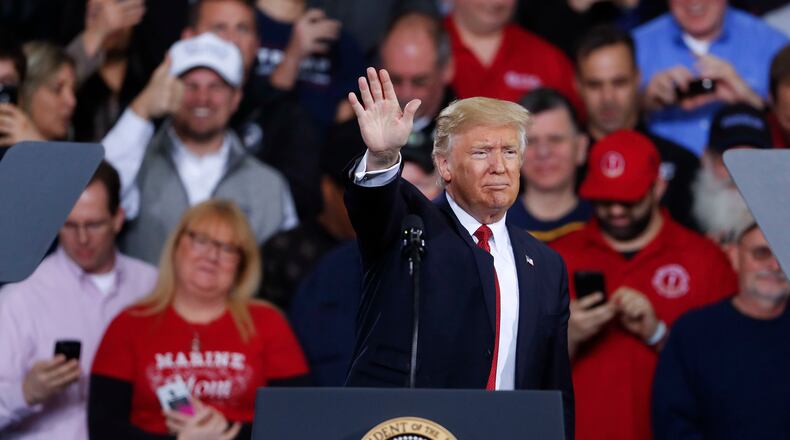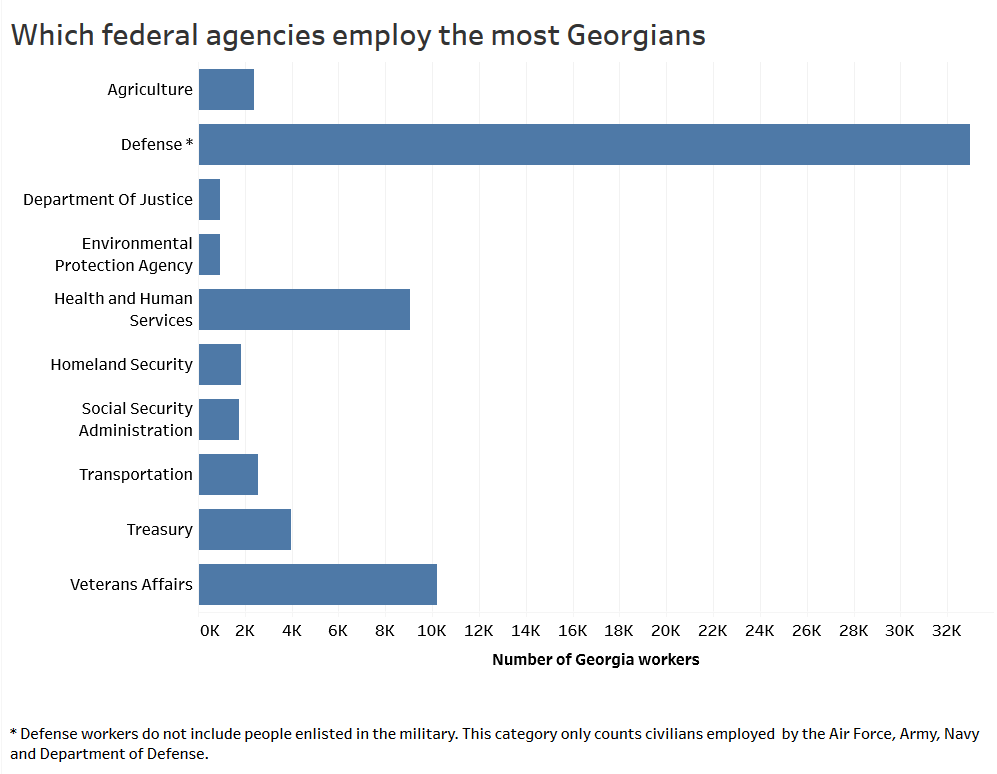President Donald Trump’s first federal budget plan has proposals that are bound to win praise from some corners of Georgia and produce a lot of worry from others.
Georgia is home to eight major military bases, has one of the largest contingencies of military personnel in the country, has military contractors and its universities are doing a lot of defense research, so Trump's call to boost military spending is welcome news to some.
But nonmilitary spending could take significant cuts. Georgia is home to the Centers for Disease Control and Prevention, its universities do hundreds of millions of dollars in federally funded research in other areas such as public health, and 29 percent of what state government spends each year comes from the federal budget, paying for things such as free and reduced school lunches, nursing home stays, workforce training and environmental protection.
It is home to more than 70,000 federal jobs, some of which could be axed if his proposal moves forward.
Some state officials say it's far too early to cheer too loudly or panic about what the president is proposing.
"The (budget) process up there is a lot longer than it is here," said state Senate Appropriations Chairman Jack Hill, R-Reidsville. "I don't know that anybody has ever taken a president's first proposals and acted on them. I would say that budget is a long way from being passed if the past is any predictor of the future."
Others said Georgians shouldn’t ignore Trump’s budget plan.
"The Georgia budget is intricately linked to the federal budget," said state Sen. Nan Orrock, D-Atlanta, a member of the Senate Appropriations Committee. "We cannot afford to turn a blind eye to Trump's budget, which is preposterous."
The president’s proposal is thin on specifics but offers his broader vision for the federal budget if he were able to make all spending decisions without Congress stepping in.
Congress, of course, will step in. And even in times of united government, it often has its own set of priorities that differs from the White House's.
Without much detail, it’s hard to figure out exactly how Trump’s proposal, if it was ultimately passed, would affect the state.
But Georgia boosters on and off Capitol Hill said they were encouraged that Trump's proposed 10 percent increase to the Pentagon's coffers would trickle down and help the state's military installations. There was particular optimism surrounding his proposed reversal of personnel cuts, as well as the president's call to commission more F-35 Joint Strike Fighters, which are partly assembled in Marietta.
“Georgia is critical to our national defense, and each of our military installations stands to benefit from increased funding for the Defense Department,” U.S. Sen. Johnny Isakson, R-Ga., said in a statement.
There were also positive reviews for Trump’s proposed 6 percent funding increase for the Department of Veterans Affairs and what Isakson said was a higher than expected request for federal law enforcement training centers, which are headquartered in South Georgia’s Glynco.
It's unclear whether the president's budget would fund work to deepen the Port of Savannah. Dredging is already underway, paid for with money borrowed by the state, but backers are counting on the federal government to pony up its $440 million share to cover the balance of the project.
Trump’s blueprint suggests a cut of $1 billion, or more than 16 percent, to the Army Corps of Engineers’ budget. But port boosters said Thursday that wouldn’t necessarily translate to similar cuts to funding for dredging work. Project backers say they need roughly $90 million annually from the federal government over the next four years to keep the project on track.
Critics of Trump’s budget warned that Georgia could be harmed by several other proposed cuts.
The president wants to end the Department of Housing and Urban Development’s 42-year-old Community Development Block Grant program, which supports urban renewal projects, suggesting that they are better handled at the state and local level. Georgia awarded $37.7 million in such grants to 74 communities in September.
Trump's budget proposes creating a $500 million grant at the CDC to help states handle public health challenges. Details were scant, but some in the health advocacy community worried that the proposed 18 percent budget cut to the Department of Health and Human Services — paired with the GOP health care bill, which would zero out the agency's Prevention and Public Health Fund — could trickle down and hurt the CDC.
The CDC directed The Atlanta Journal-Constitution to a statement from Trump’s health secretary, Tom Price, a former Republican Georgia congressman, who said the budget “will help ensure we are delivering critical services to our fellow citizens in the most efficient and effective manner possible.”
One senior Georgia staffer on Capitol Hill, who was not authorized to speak on the record, said several of Trump’s proposed cuts would disproportionately hurt rural Georgians.
The aide said cuts to the Department of Labor's budget could harm the office that administers the H2-A visa program that helps connect farmers with foreign migrant workers at harvest time. Workflow issues at the Labor Department have already led to revenue losses for Georgia farmers.
Trump’s budget would eliminate the Legal Services Corp., which provides legal aid for people who cannot afford their own attorneys in civil cases. Atlanta Legal Aid, which represented 33,000 people in the five-county metro area in 2015, received 40 percent of its funding from the Legal Services Corp.
Atlanta lawyer Linda Klein, the president of the American Bar Association, said legal aid is used to help people like veterans, domestic violence victims and the elderly.
“This would cause a crisis in access to justice,” Klein said. “Courthouse doors will slam in the faces of millions of Americans.”
A huge swath of state government relies on federal funding. Georgia Medicaid, the health care program for the poor, disabled and nursing home patients, is slated to receive more than $7 billion in funding from the federal government this year. The Georgia Department of Natural Resources’ Environmental Protection Division gets about one-third of its funding from the federal government. The U.S. Environmental Protection Agency would feel the biggest cut of any Cabinet-level agency under the president’s proposal.
Research is another area some fear Trump and Republican lawmakers will cut. Defense research, some of which is done at Georgia Tech, may benefit from the president’s budget. Health care research at places such as Georgia State University may not.
Michael Cassidy, the president of the Georgia Research Alliance, said the state’s universities did about $1.2 billion worth of federally funded research in 2016.
“Federal funding is the lifeblood of university research,” he said. “What comes from this research? It is going to lead to massive improvements in health, energy, agriculture.”
Cassidy said more than 150 companies in Georgia have roots in federally funded university research.
A lot of the potential impact from Trump’s proposal isn’t yet known since many details won’t be released until later this spring.
Hill, the Georgia Senate’s longtime budget chairman, noted that much of the state’s congressional delegation served in the state Legislature, and he said they understand the importance of federal programs locally.
“Most of these folks have come up through the political system and have a good feel for what’s important to their district,” Hill said. “When it comes down to appropriating, they are going to consider what’s good for the country, for Georgia and what’s good for their district.”
He said conservatives who have longed to see the federal deficit slashed “want to see the battleship turned in the right direction.”
“Whether you do that with a laser rather than a meat cleaver is a good question.”
Federal spending in Georgia
The state receives billions of dollars from the federal government each year to pay for programs such as public health care, food stamps, university research and road building. Below are some of the agencies slated to get big federal money during the upcoming fiscal year and therefore could be most affected by changes in Washington:
Department of Community Health (Medicaid)
$7.6 billion
Department of Education (school nutrition programs, others)
$1.9 billion
Department of Transportation
$1.6 billion
University System of Georgia
$1.4 billion
Department of Human Services (food stamps, other programs)
$1 billion
Department of Public Health
$397 million
Georgia Department of Early Care and Learning
$375 million
Department of Community Affairs (housing and community programs)
$184 million
Department of Behavioral Health & Development Disabilities
$144 million
Department of Labor (unemployment, workforce development)
$117 million
Department of Economic Development (workforce development)
$74 million
Department of Natural Resources (environmental protection, other programs)
$72 million
Georgia Bureau of Investigation (criminal justice coordination)
$68.5 million
Department of Defense
$53.2 million
Source: Governor’s proposed budget for fiscal 2018, University System of Georgia
Keep Reading
The Latest
Featured






